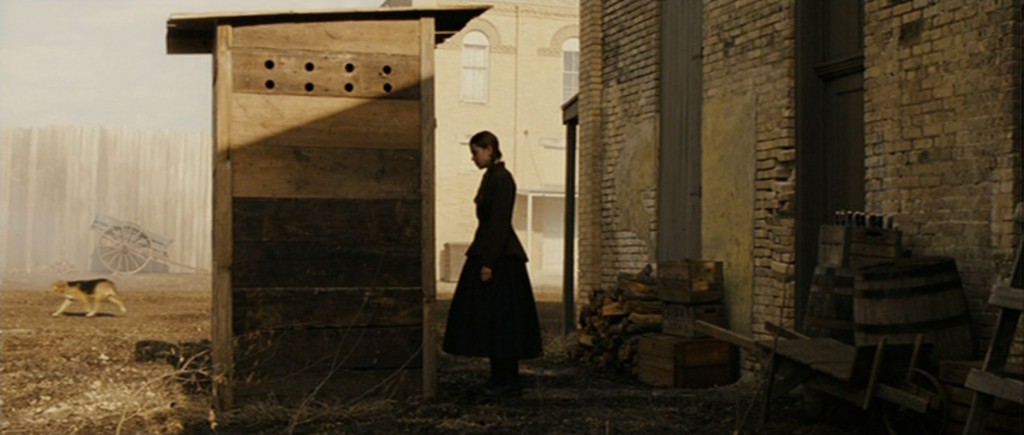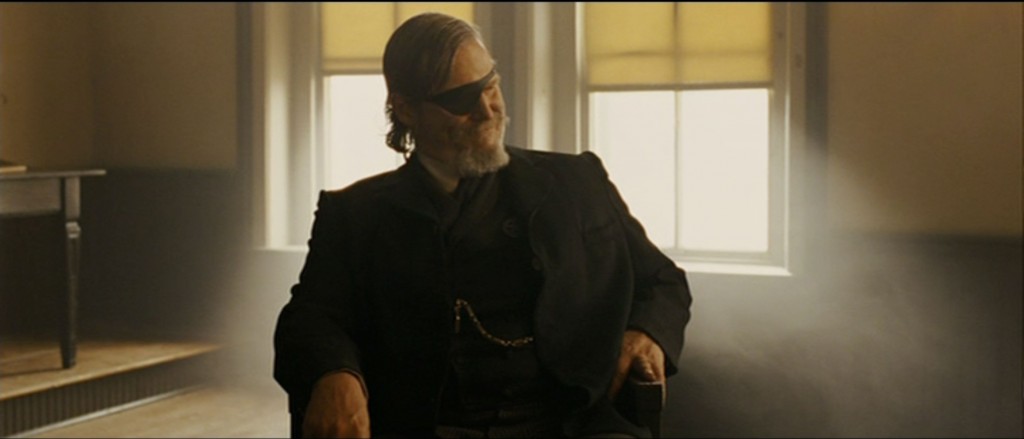True Grit part 3
Spoilers.
Mattie Ross wants to see Tom Chaney dead. If possible, she’d like to kill him herself. Her second choice is to see him hanged by the intolerant Judge Parker. To make these things happen, she needs a federal marshal to catch him. She selects Rooster Cogburn because the sheriff has assured her that he is the meanest bastard available.
She finds Rooster in an outhouse behind a saloon, taking too long at his “business” to suit her; her Presbyterian reserve does not stop her from repeatedly demanding that he speed things along. The scene is not from the novel and serves two functions – first, it shows that Mattie recognizes no one’s rights or privacy when her own interests are at stake, and second it shows her first meeting with Rooster with the marshal at a decided disadvantage. He’s not merely human, he’s desperately so.
(Speaking of nature’s call, in Act II we will receive report of LaBeouf doing his “business” by a creek, but we never see or hear about Mattie doing likewise. Everyone poops in this movie, except Mattie.)
(Many scenes in True Grit, if not all, are scenes of negotiation – you give me this, I’ll give you that. Mattie is a born negotiator, but it seems that one thing she cannot negotiate is Rooster Cogburn’s bowel movements. “There ain’t no clock on my business!” he cries when she tries to ply him.)
Mattie’s father’s body is loaded aboard a train and sent back to Yell County, while Mattie stays behind to seek vengeance for his death. But what did she really feel for her father? Based on the evidence, almost nothing at all. In fact, based on the evidence, it’s hard to tell if Mattie feels strongly about much at all. Late in the novel, she plainly states that the only things she cares about are her church and her money, and, sure enough, throughout the first act of the movie, that’s all that seems to motivate her – her church, which gives her her overwhelming sense of superiority, and her money, which gives her the power to get her way.
Speaking of which. All Coen Bros movies have a character who represents “capital,” the character who controls the purse strings and ultimately says what’s what. In Blood Simple it’s Marty, the bar owner, in Fargo it’s Wade, Jerry’s father-in-law, in No Country it’s The Man Who Hires Wells. True Grit, if I’m not mistaken, is the first time the Coens have made their “capital” character the protagonist. And Mattie fulfills the role in spades. She was born to hold purse strings and say what’s what.
Having spent her cash on shipping her father, Mattie returns to the undertaker’s to sleep among the dead. She sees one of the recent condemned man’s hand peek out from under its shawl – is it the hand of the Repentant Man or the Unrepentant? Or even the Indian? It doesn’t matter – justice has been served, if justice is what it is, and however the three men met their end, they are all dead now, and Mattie is among them. (This scene is also not in the novel.)
The next day, Mattie goes to see Col Stonehill, a horse trader. Mattie’s father had come to Fort Smith to buy some ponies from him. What does Mattie want from Col Stonehill? Money, and rather a good deal of it. She doesn’t deserve it and she’s not entitled to it, but she will have it. She goes to his office on the pretext of being a wealthy cotton farmer, the better to impress Stonehill with her substance, and then proceeds to use every trick she can think of to press the man into handing over money he does not owe her. She demands that he buy back the ponies her father bought from him, then accuses him of not properly guarding her father’s horse, then challenges him on every aspect of his trade, threatening him with expensive legal action if he does not give in to her demands.
This is called extortion. We like Mattie when she bends Stonehill to her will, because she’s 14 and plucky and he’s an old fuddy-duddy, but let’s not bandy words – she’s extorting money from him. And she’s not a lovable American rogue, with a twinkle in her eye and a dash of style, she’s hard-driving and merciless. That is to say, she’s not Tom Sawyer, her rough contemporary, she’s more like Tom Sawyer’s dark shadow.
After getting what she wants from Stonehill, she goes to get a room at the Monarch Boarding House, where her father was killed. The dithering landlady is sympathetic to Mattie, but only up to a point – when it comes time to hand over Mattie’s father’s belongings, she takes the opportunity to sell her an “old flour sack” in which to put her father’s gun “for a nickel.” This beat, which is also not in the novel (in the book, the sheriff hands over her father’s gun and throws in the flour sack for free), underscores the theme of everyone in the movie being money-grubbing sinners. (The landlady doesn’t recognize Mattie’s quote from Ezekiel, which makes her damned as well – doubly damned.)
We are meant to sneer at the nickel-cadging landlady, and yet we cheer Mattie’s extortion of Stonehill. Again, it’s, I think, a question of age – Mattie as a cold-hearted extortionist is thrilling when she’s 14, but Mattie as a grown woman is a much different proposition – which is part of the punch of the movie’s closing minutes.
Mattie has money now, but that doesn’t mean there is room at the inn – she has to double up with “Grandma Turner,” who lives up to her name by turning over in her sleep and stealing Mattie’s blankets. Even in sleep, the people of Fort Smith are forever taking things from Mattie – or so it seems to her.
The next day, Mattie goes to Judge Parker’s courthouse just in time to see Rooster Cogburn testify in a trial. Up until now, we’ve seen Mattie negotiate many situations – her staying in Fort Smith, her haggling with the undertaker, her decimation of Col Stonehill – but now she is exposed to a negotiation of the highest stakes; now she sees a court negotiate for a man’s life.
What is at stake in this scene? Mattie is seeing Rooster Cogburn for the first time, as he testifies as to the circumstances under which he arrested the man on trial. The question is not “is the man guilty?” but “is Rooster a good person?” In the prosecution’s presentation, Rooster is a resourceful, brave and just man, doing a hard job in a dangerous environment. To the defense, however, Rooster is a coward, a drunk, a bully and a murderer.
Which is he? The scene doesn’t answer the question. And the truth isn’t “somewhere in the middle,” it’s one or the other. Or perhaps, as it is in A Serious Man, both things are true at the same time.
In any case, the question doesn’t bother Mattie. Rooster goes into a robber’s camp and kills two men and brings the third to Judge Parker (who is sure to hang him), and that’s what she wants – bloody vengeance. This is, I think, the third thing Mattie loves, after church and money. Church, money and vengeance form a kind of holy trinity in Mattie’s mind.
She corners Rooster in the courthouse stairwell and begins yet another hard negotiation – I give you fifty dollars, you will hunt and kill a man, or give me the opportunity to do so myself. She says, openly, that she doesn’t care about “the law,” she wants Chaney dead and will do whatever she needs to do to accomplish that. Will Rooster be her partner in this vengeance or not?



Great stuff, as always.
Not to distract you from your deconstruction of Mattie, but seeing as the outhouse scene is a Coen invention, any thoughts on how that serves as an introduction to Rooster? Clearly the courtroom scene is where we are supposed to meet him for the first time, and yet we’ve got this bit of him being caught–literally–with his pants down prior.
Looking at it as a screenwriter, I’d say they put the outhouse scene in to connect Mattie to Rooster as soon as possible — she gets his name from the sheriff and goes looking directly for him. In the novel, she waits until she can see him testify.
“She demands that he buy back the ponies her father sold him,…”
I’m not 100%, but isn’t it that the Col. has sold her father a string of ponies, which she points out she no longer needs, and thus sells them back to the Col. (who claims he doesn’t need them either)? My sense was that the negotiation between them was not outright extortion, but rather Mattie getting a better than fair price out of the Col. for the ponies and browbeating him into buying his goods back.
Also, I rather enjoyed that she constantly appealed to the Law, and referenced that she had a good lawyer on retainer. Mattie seems to be a representative of the civil law (rather than the criminal law that Judge Parker, LaBouef, or Cogburn represent) that will be coming to the frontier in due time.
You are correct — Stonehill sold her father the ponies and Mattie wants to sell them back. The ponies are useless to Stonehill (or so he gripes) but they are still ponies.